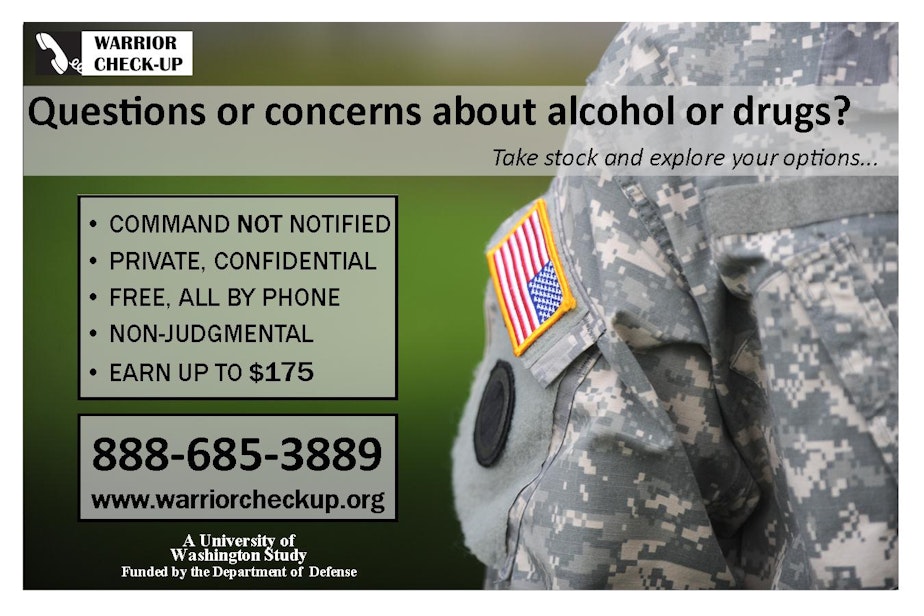When it comes to substance abuse and soldiers, confidentiality helps

Heavy alcohol use and binge drinking are on the rise in the military. And many service members with a problem don’t voluntarily seek treatment.
Research from the University of Washington found that allowing soldiers to assess the impacts of their drinking confidentially can help them cut down.
There are lots of reasons military service members are more prone to abuse alcohol than their civilian counterparts: They’re mostly male, they’re mostly young and they’re under a lot of stress.
Benjamin Nordstrom is familiar with the factors that lead to this stress. He is the chief clinical officer at Phoenix House, a substance abuse treatment center. “Certainly the isolation in some of the posts, the fact culturally that it's kind of a closed institution, lead to drinking patterns that are not always healthy,” Nordstrom said.
Nordstrom said there’s another big reason why drinking is a particular problem in the military: Service members can’t seek help without their commanders finding out.
Sponsored
“A lot of it is the concern about stigma. It's the concern about derailing careers,” Nordstrom said. “People really get concerned that it's going to lead to them not being able to deploy, it's not going to allow them to get promoted, or it's going to get them into some kind of trouble.”
Researchers have known for years that the lack of confidentiality in the military can keep problem drinkers from getting help. A recent study showed the possible benefits of discreet intervention.
The University of Washington School of Social Work invited soldiers at nearby Joint Base Lewis-McChord to examine their drinking habits. Posters that recruited the soldiers made it clear that their commanders wouldn’t be notified.
After the soldiers were assessed, counselors talked with soldiers about their drinking during a single 60-minute phone call. During the call, counselors acted as a sounding board to help participants reflect on the role that alcohol or drugs played in their life.
Study director Denise Walker at the UW’s Innovative Programs Research Group said this intervention allowed study participants to understand the consequences of their drinking without fearing for their jobs. Even the study name, Warrior Checkup, had a purpose.
Sponsored
“It’s just a checkup,” Walker said. “And with this project another barrier that is really eliminated is they don't even have to walk into a building that would ordinarily say 'Army substance abuse program.' They don't even need to do that. They just need to pick up the phone.”
The results were promising. When researchers checked back six months later the soldiers in the study cut their average number of drinks per week nearly in half, from 32 to 14.
“You can imagine the effects on your health if you're drinking 32 drinks a week and then go down to 14,” Walker said. “But also 14 drinks per week is actually within healthy guidelines that the National Institute on Alcoholism and Alcohol Abuse considers to be a relatively healthy level of drinking. So not only were these reductions statistically significant, they're clinically meaningful.”
But so far Walker's research remains just research.
The Army has experimented in the past with confidential substance abuse intervention programs but has yet to roll them out Army wide. The Department of Defense even funded Walker's study.
Sponsored
Lt. Col. Christopher Ivany, Army director of psychological health, said the issue of confidentially is complex because of the Army's mission.
“There has not been any regulatory changes as of yet in that area,” Ivany said. “But what I can tell you is that the Army is looking at all the options to determine if those are possible. And if so, what the best way is to go about that.”
Walker – whose research was published in the Journal of Consulting and Clinical Psychology – said she has contacted leaders at JBLM about the study but has heard nothing back. Though the Army has long been reluctant to provide confidential substance abuse treatment, Walker said soldiers need what she calls “a safe place” to talk candidly about their drinking.

